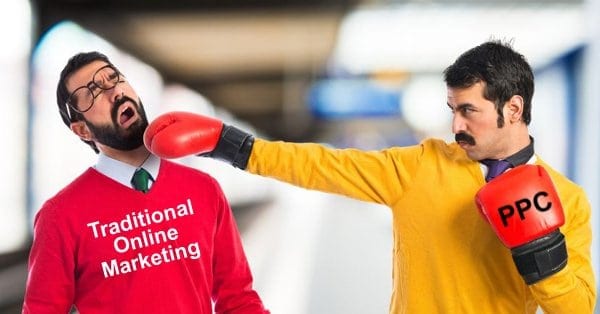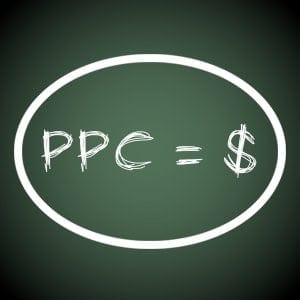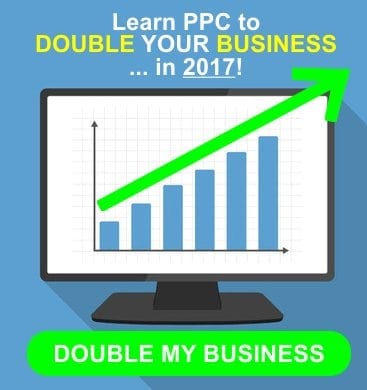
It’s too expensive. It’s not for small businesses. It’s too technical. It doesn’t work with my type of business. I don’t have a good enough website. Etc, etc, etc.
And I get it. There’s a lot of reasons to NOT like Adwords PPC. However, are those reasons ones that YOU know for sure? Or are you just repeating what others have said or written about.
In this blog post, we’re going to discuss the advantages / disadvantages of PPC and other forms of traditional online marketing. With that said, I realize that online marketing hasn’t been around for that long, so traditional may be the wrong term. But it’s my blog post and I can call it whatever I want (and traditional it shall be).
Also, when we’re talking about “Traditional Online Marketing”, we’re only going to be talking about some of the bigger tactics:
- SEO (search engine optimization)
- Email Marketing
- Social Media Marketing
- Blogging / Content Marketing
- and of course Pay Per Click Marketing (PPC)
While this is not all of the online marketing types, these are the ones that most people are doing / trying. We’re also going to list some of the biggest advantages and disadvantages of each as we go through them. Let’s get to it!
SEO (Search Engine Optimization)

SEO is the process of ranking your website (or a web page) in the search engines. Now, we’re not talking about the ads at the top of the page, we’re talking about the “Organic” listings below the ads.
SEO is done through a number of factors (not limited to the following): keywords, legitimate links to the website, social sharing, who wrote the content (are they legitimate) and many others.
Why Do We Do It?
It’s a great way to let the search engines know what your website is about. It’s FREE traffic. There are people that do skip the ads and go right to the organic content when looking for something.
Advantages for SEO:
It’s FREE TRAFFIC. When a page is ranking well in the organic listings, it can bring in a lot of free traffic for a VERY long time.
It’s targeted traffic. If you’re getting a page to rank well for a particular keyword, it’s probably a very good piece of content and speaks to the person who may be looking for that particular content.
Disadvantages for SEO:
It’s SLOW. Because of people trying to spam the search engines for so long, the search engines have fought back and made it VERY difficult for a small business website with few pages to get ranked for competitive keywords.
It takes a LOT of time. SEO can get one page ranked for a keyword (or a few keywords). But if you’re trying to get ranked for a lot of keywords (which most of us are), it’s going to take a LOT of content. Hence, a lot of time.
It can be VERY expensive. SEO takes time, which costs money.
There’s no guarantee! While you can do EVERYTHING correctly with SEO, there is no guarantee that you will be ranked for the keywords that you want. The more consistent that you are and the better you do it, you’re improving your chances, but there’s no guarantee that your content will ever get ranked on the first page of Google.
You have NO control. When doing SEO, you can’t control if it’s going to work or not. You don’t control if your listing goes up or down. You don’t get a say in how long it will be there. It’s up to the search engines and only them.
Tracking. Tracking what is working and converting to sales with SEO is VERY difficult. Sure, you can track a link in a blog post that led to a sale on an eCommerce website, but it’s much harder with a service type of business or a business where someone may call you for your products or services.
Email Marketing

Email marketing is the process of reaching out to an email list with an offer, update, news, etc. This is typically done through an email service provider.
Why We Do it?
Because it flat out WORKS! Email marketing is still one of the BEST ways to marketing your business / service. The reason is that you already have a relationship with those people. Now this is assuming that the email list that you’re sending to is not one that you purchased from some black hack website on the net.
Advantages for Email Marketing:
You have a relationship with these people. They already know you.
Lower cost. A typical email service provider can cost around $30/month depending on the email list size. And usually you can send those people an email whenever you want (but don’t overdo this). There’s no printing costs or mailing costs.
Speed. You can craft an email and have it sent to your entire email list in MINUTES. Try that with a TV or radio commercial or a billboard.
Conversion rates. When expert marketers start their marketing, they typically start with their customer list (email list) first. It’s much more expensive to try to sell to cold traffic than it is to people who already know you. Hence, higher conversion rates.
Trust. Perhaps you’ve done business with them. Maybe they’ve read your work before. They TRUST you, or trust you more than a lot of other people (as you have their email address and we hold those tighter than our wallets at a pickpocket convention).
Tracking. While a LOT of marketing is difficult to track, email marketing is very EASY to track. Put a tracking link and conversion code on your website and VIOLA! You know if that email you sent out is leading to any sales on your website.
Disadvantages for Email Marketing:
SPAM. If you’re sending emails out to a bad list, or a list that hasn’t been sent anything in a long period of time, you’re going to get flagged for spam. The reason is that when people sign up for something, they want some value. If you go a year without being in touch with them, they may forget they signed up and then you get hit with a spam complaint.
Unsubscribes. If you are sending out a lot of crappy content or trying to make another sale to your email list every week, your contacts are just going to flat out “unsubscribe” (a groan comes over the crowd). Email marketing is about keeping in contact and offering something to your list in exchange for their email address. You try to sell a new product to them everyday and the relationship will be short lived.
Deliverability. When using an email service, sometimes there are deliverability issues. Maybe the person you’re sending the email to no longer has that email address. Maybe it’s being caught by their spam filter. Maybe they are not even getting through to the email box because the service provider you’ve sent it to is flagging it (this seems to happen with Yahoo email addresses quite often). If no one is seeing your emails, no one is buying your products because of email marketing.
(NOTE: Want to Learn to Set Up & Manage a PPC Account? You can do that HERE.)
Social Media Marketing

Social media marketing is getting your message out to your peeps using a social media account. Facebook, Twitter, LinkedIn, Instagram, Pinterest, etc. These are all different social media platforms.
If you’re PAYING for advertising on Facebook, Twitter or other social media platforms, that would fall under the the PPC or Pay Per Click marketing section. It’s considered PPC marketing that just happens to be on a social media site.
Why Do We Do It?
Well, everyone else is doing it. Actually, social media marketing can be very effective for specific industries. However, if you’re trying to sell toilet seats, you might be better served spending your time/money elsewhere. Although, you could have quite the comical, viral social media campaign with a toilet seat company (but it may just be funny and not actually lead to any sales).
Advantages for Social Media Marketing:
Cost. If you’re doing it yourself, it’s free (well, except for that whole pesky time is money thing). The platforms are typically free and you can create a profile and post messages.
Disadvantages for Social Media Marketing:
You need a following. If you have a social media presence and no one is a fan of yours, then it’s not going to work very well (i.e. don’t quit your day job).
Deliverability. Just because you have 100 fans, doesn’t mean that all 100 of those fans will see your message. back in 2015, it was shown that only about 15% of Facebook fans actually saw the messages that were posted by accounts that they liked/followed. However, this can be improved with better quality posts and posts that your fans interact with.
Time (see advantages above about the whole time is money thing). It can take a LONG time to effectively build a social media audience. Even if you do, it doesn’t mean that they will see your message.
Blogging / Content Marketing

Blogging or content marketing is building content for the web to gather eyeballs on your message, company, or to gather fans or sales. This can be done through blog posts, case studies, videos, etc.
Why Do We Do It?
It’s a great way to get SEO traffic to your website.
It’s a great way to showcase what you can do.
Great content can bring in a LOT of traffic from various sources.
Advantages for Blogging / Content Marketing:
Show your expertise. If you’re blogging consistently about a particular topic, chances are that you know more about it than 95% of the rest of us. Now please take this with a grain of salt. Sure, I could be blogging 5 days a week about knowing the exact way to train a dog, but if you met my dog you would know I’m a fraud. With that said, I’m probably not going to blog about it five days a week because I obviously don’t have that much to say about it (as my dog tears up a shoe in the corner).
Cost. Sure it’s free (except for the time part) if you do it yourself. But to do it over the long term, this can take a LOT of time.
Disadvantages for Blogging / Content Marketing:
Time. Putting out great content is not easy and does take a lot of time.
Not guaranteed to get picked up. Just because you build it, does not mean that people will come (does that date me when I quote “Field of Dreams”?) Just because you spent 3 hours crafting a great post does not mean that Google will list you first on it’s pages. You can promote it with social media, but that doesn’t mean anything either.
Consistency. Great blogging and content marketing works best with consistency. And you NEED To be consistent. However, it’s VERY hard to sit down and write a good blog post week after week. In fact, most people only last about 1 week.
PPC (Pay Per Click) Marketing

Pay per click marketing (or PPC) is the practice of placing advertisements on the search engines (or throughout other platforms). This can be done with text ads on Google, Bing, and others or image ads on various websites throughout the internet.
Yes, Facebook advertising falls into this as well. Just because it’s on Facebook, does not mean that it’s social media marketing. If you’re paying for it on Facebook, it’s considered PPC.
Why Do We Do It?
It the quickest and easiest way to get to your target market. Not only that, but we can change our ads frequently, test a lot of different things, and pay as much as we want to.
Advantages for PPC Pay Per Click Marketing:
Quick. This is one of the biggest reasons that people do it. I can literally craft a message and have it in front of people around the world in a matter of minutes (assuming that it’s gets approved by the advertising platform quickly). I’ve literally made a sale in 12 minutes from the time that I posted the ad.
Flexibility. Not only can you have an ad posted quickly, but you can also change it if you need to. Sometimes it doesn’t work like you want it to and you want to make some changes. This allows you do do that at ANY time.
Control. You can control where you ad is showing up and when. It can be on certain websites (that have that functionality). It can be at certain times of day. In certain countries or just within 5 miles of your business location. It can show up for 1 keyword or 1000. It’s all up to you.
Testing. Sure, you can test blog posts, social media messages, content marketing and everything else, but not as quickly and easily as you can with PPC marketing. Craft an additional ad in a matter of seconds and test it against the first ad. This is VERY easy to do and allows you to always keep improving your campaigns.
Cost Effective. This is where a lot of people get it wrong. If you setup and manage a PPC campaign correctly, clicks can cost you CENTS and not dollars. Even if it does cost you dollars, where else can you put yourself in front of someone RIGHT WHEN they are looking for you. If someone types in “emergency plumber” and you happen to be one of those, you can show up IMMEDIATELY when they search for you. That’s called a GREAT lead.
It’s For Any Business Type. You can use PPC marketing for any business. Service, eCommerce, product without ability to sell online, brick and mortar, anything. Sure, it does work better with some business types, but there is a way to make it work for ALL of them.
You Don’t Need A Website. Regardless of what people think, you actually DON’T need a website with PPC marketing. You can do it with just a domain name ($12.00/year) or even just a social media page (however a domain name works best). You do this by creating a landing page that can be done in minutes.
Disadvantages for PPC Pay Per Click Marketing:
Cost. Yes, this is a disadvantage as well as an advantage for PPC marketing. This can be a disadvantage when you don’t set your budget correctly. There are safeguards against this (like a place that says BUDGET), but if you dive in too quickly and without setting it up correctly, that can cause problems.
Technical. Yes, sometimes it can get a bit technical. However, when shown how to do it correctly, and step-by-step, this can be a very easy process (especially for a small business with a smaller advertising budget). Click Here if you want to learn how to set up effective and correct PPC campaigns.
Well, hopefully you’ve learned something about different online marketing types and the advantages and disadvantages. I know that I sure have! 🙂 Now go forth and conquer!
(NOTE: Want to Learn to Set Up & Manage a PPC Account? You can do that HERE.)
